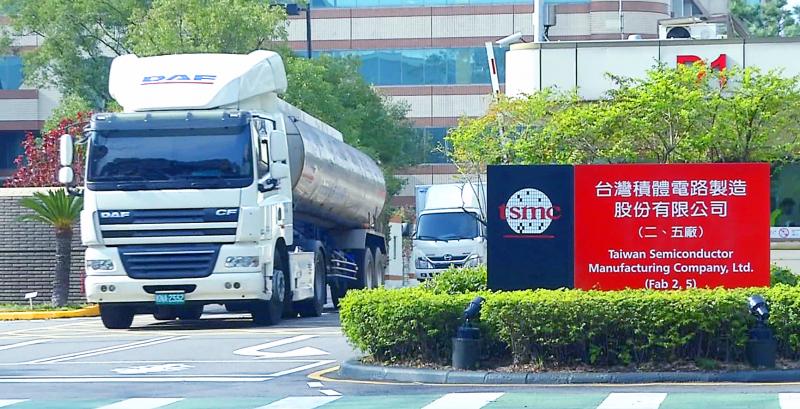Taiwan Semiconductor Manufacturing Co (TSMC, 台積電) last year saved almost 2 million tonnes of water as part of its efforts to fulfill its commitment to reach net-zero emissions by 2050, the company’s financial disclosure report said.
To reach its zero emissions goal, TSMC has been taking action to broaden its green influence and drive industry toward low-carbon sustainability, chairman Mark Liu (劉德音) said in the company’s Task Force on Climate-related Financial Disclosures report released last week.
TSMC saved 1.927 million tonnes of water last year by adopting measures such as reducing water consumption by facility systems, increasing wastewater recycling by facilities and decreasing water discharge from the systems, the report said.

Photo: CNA
Last year, it also invested NT$1.6 billion (US$57.69 million) in water conservation and recycling equipment, and spent an additional NT$1.2 billion on equipment operation and maintenance, it said.
By 2030, TSMC aims to reduce the amount of water it uses by 30 percent from 2010, the report said, adding that its water consumption last year fell 8.9 percent from 2010.
After Taiwan experienced a major water shortage from the end of last year to May, TSMC compiled statistics for drought risk assessments in the report, which showed that from 1986 to 2005 the longest Hsinchu City and Hsinchu County had gone without rain was 40 days, while for Taichung it was 52 days and for Tainan 62 days.
The number of days Hsinchu City and Hsinchu County, Taichung and Tainan would go without rain in 2035 is forecast to rise 4.15 percent, 2.42 percent and 2.28 percent respectively from 2016, the company said.
From 2081 to 2100, the longest stretch without precipitation in Hsinchu City and Hsinchu County could increase 14.44 percent from the 1985-to-2005 period, and it could grow 11.33 percent for Taichung and 10.73 percent for Tainan, it said.
If a drought occurs every 10 years, it could cause an average reduction of 0.7 to 1.1 percent in TSMC’s annual operating revenue, the company said.
As water shortages in Taiwan are likely to worsen, TSMC said it has also established a comprehensive water monitoring mechanism to regularly check the status of water supplies in the country.
The company is improving its water conservation measures, increasing the recycling rate of process wastewater and establishing comprehensive monitoring mechanisms for water supply, the report said.
It is also expanding the use of reclaimed water, and preparing water trucks to minimize the effect of water shortages on operations and eliminate production interruptions, it said.

‘SWASTICAR’: Tesla CEO Elon Musk’s close association with Donald Trump has prompted opponents to brand him a ‘Nazi’ and resulted in a dramatic drop in sales Demonstrators descended on Tesla Inc dealerships across the US, and in Europe and Canada on Saturday to protest company chief Elon Musk, who has amassed extraordinary power as a top adviser to US President Donald Trump. Waving signs with messages such as “Musk is stealing our money” and “Reclaim our country,” the protests largely took place peacefully following fiery episodes of vandalism on Tesla vehicles, dealerships and other facilities in recent weeks that US officials have denounced as terrorism. Hundreds rallied on Saturday outside the Tesla dealership in Manhattan. Some blasted Musk, the world’s richest man, while others demanded the shuttering of his

ADVERSARIES: The new list includes 11 entities in China and one in Taiwan, which is a local branch of Chinese cloud computing firm Inspur Group The US added dozens of entities to a trade blacklist on Tuesday, the US Department of Commerce said, in part to disrupt Beijing’s artificial intelligence (AI) and advanced computing capabilities. The action affects 80 entities from countries including China, the United Arab Emirates and Iran, with the commerce department citing their “activities contrary to US national security and foreign policy.” Those added to the “entity list” are restricted from obtaining US items and technologies without government authorization. “We will not allow adversaries to exploit American technology to bolster their own militaries and threaten American lives,” US Secretary of Commerce Howard Lutnick said. The entities

Minister of Finance Chuang Tsui-yun (莊翠雲) yesterday told lawmakers that she “would not speculate,” but a “response plan” has been prepared in case Taiwan is targeted by US President Donald Trump’s reciprocal tariffs, which are to be announced on Wednesday next week. The Trump administration, including US Secretary of the Treasury Scott Bessent, has said that much of the proposed reciprocal tariffs would focus on the 15 countries that have the highest trade surpluses with the US. Bessent has referred to those countries as the “dirty 15,” but has not named them. Last year, Taiwan’s US$73.9 billion trade surplus with the US

Prices of gasoline and diesel products at domestic gas stations are to fall NT$0.2 and NT$0.1 per liter respectively this week, even though international crude oil prices rose last week, CPC Corp, Taiwan (台灣中油) and Formosa Petrochemical Corp (台塑石化) said yesterday. International crude oil prices continued rising last week, as the US Energy Information Administration reported a larger-than-expected drop in US commercial crude oil inventories, CPC said in a statement. Based on the company’s floating oil price formula, the cost of crude oil rose 2.38 percent last week from a week earlier, it said. News that US President Donald Trump plans a “secondary